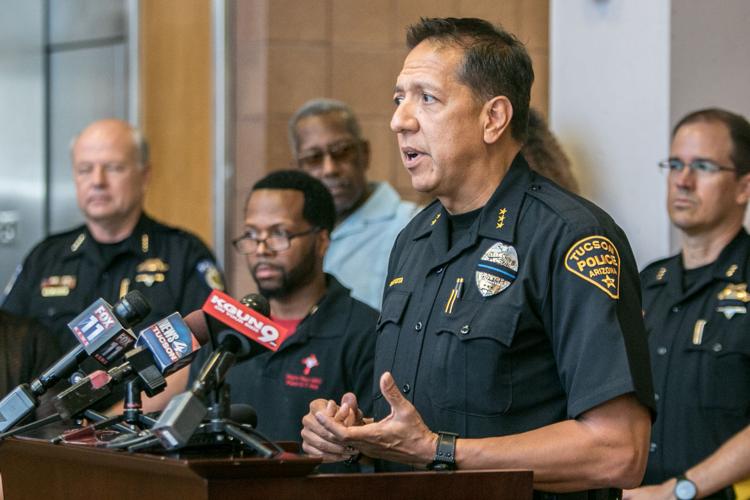The news knocked the wind out of some TUSD employees last week, leaving them fearful and mystified.
Tucson police arrested and took to jail a middle-school counselor and vice principal who failed to report a case of student-on-student abuse in a classroom. A 12-year-old boy grabbed the breast of a 12-year-old girl, police said, and the Roberts-Naylor Middle School staff members didn’t report it.
Still, why arrest them and charge them with failing to report — a felony?!
From what he’s seen, Tucson Education Association President Jason Freed told me, “There doesn’t seem to be any rational explanation for this one incident to have this kind of a response, when similar incidents haven’t had a similar kind of response.”
Therein, however, may lie the explanation.
The relationship between Tucson police and the Tucson Unified School District has had spikes of conflict over the last couple of years. As KGUN’s Valerie Cavazos has reported, the previous police chief, Roberto Villaseñor, wrote a letter to TUSD demanding better discipline after a September 2015 brawl at Palo Verde High School, which he called “a school with no consequences.”
Last year, the principal of Cholla High School waited a week before reporting that a teacher, Eddie Rodriguez, had inappropriately touched a student. Rodriguez was later charged with sexual abuse.
Tucson police, it appears, are bringing the hammer down after seeing too many cases of TUSD employees not adhering strictly to state law and district policies that require teachers and other school employees to report to police or the Department of Child Safety any cases in which children are victims of abuse.
“At the beginning of the year, we initiated conversations with their legal advisers to help them rectify some of the concerns we’d had with following the law and their own guidebook,” Assistant Police Chief Ramon Batista told me Tuesday.
With police Chief Chris Magnus’ blessing, Batista made the call on arresting counselor Linda Archuleta and vice principal Bernadette Rosthenhauler.
“The evidence that we had in this case that they had failed to report was overwhelming,” he said.
The complaint filed in Pima County Justice Court makes it clear precisely what bothered the police. The detective wrote:
“School staff conducted their own investigation and the police were not notified. The 12 year old sexual abuse victim’s mother went to the school and spoke with the defendant (Rosthenhausler) and school counselor telling them she wanted to prosecute for the sexual abuse. The defendant, along with the counselor both told the victim’s mother they did not have to call the police to report the sexual abuse. Victim’s mother was provided the TPD non emergency (number) by the counselor and was told she needed to report the incident since she wanted to prosecute for sexual abuse.”
State law mandates that people in many different professions report it if they learn a child has been a victim of abuse, deliberate neglect or other offenses. Teachers, counselors, nurses, doctors, priests, pastors and police officers all are required by law to report. Failure to report is a felony, yet these two said, according to the complaint, they were not required to report.
Still, the law is most directly intended to ensure that abuse of children by adults is reported. Mistreatment of one child by another often may fit into a grayer area of interpretation, as Freed explained.
“I think part of the challenge is, with adolescents, there’s plenty of time they make foolish decisions that really are relegated to foolishness rather than predatory behavior,” he said.
We don’t want to turn every single student conflict into a potential criminal matter.
Still, school employees are trained every year — twice in this school year, TUSD spokeswoman Stefanie Boe told me — to report any possible incidents of abuse of students. And the obvious rule to follow is: When in doubt, report.
But TUSD has countervailing forces that may make employees question that guidance. The “restorative discipline” approach that is mandated by the district’s desegregation case takes a less punitive approach to student discipline. Instead of suspending a student, for example, the administrators may convene a “restorative circle” in which conflicts are discussed and resolved.
Expelling or suspending students also peels numbers away from the district’s enrollment. So perhaps it’s not surprising some employees seem to have taken their reporting requirements less seriously than they are required to.
But the bottom line is, they are required, and the requirements are there for a reason. I first came across these reporting mandates when covering the child sexual abuse scandal in the Catholic Church — a situation that was rife with adults in power covering up abuse instead of reporting. That scandal showed better than any why adults in positions to learn of possible child abuse simply need to report, not burden themselves with weighing whether it’s right.
“Now, any time something happens, because of this situation, teachers are going to be calling 911 even more so,” Freed told me. “The goal isn’t to flood the 911 system, but it’s that if this is the environment we’re living in, educators are going to have to respond in kind.”
Indeed, Batista said, police noticed an increase in reports in the days after the arrests last week. It’s too bad that means police will be responding to some pretty minor conflicts at schools, but that beats the alternative.





